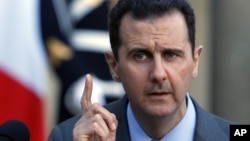When a government is corrupt, and serving only the interests of a privileged few, the populace reacts in protest if it has that opportunity, according to a new report.
Along with civil protest, corruption can also trigger and help to sustain violent insurgency in reaction to its presence. That’s the focus of the new report from the Washington-based Carnegie Endowment for International Peace, facilitated by Carnegie Senior Associate Sarah Chayes.
“If you look at every country where there is an extremist insurgency,” says Chayes, “if you look at half a dozen or a dozen countries that, in the last four or five years, have undergone revolution or something close to it - almost every single time, the government in question has been, I would say, severely corrupt."
The Carnegie report notes that “Twelve of the fifteen lowest-ranking countries on Transparency International’s 2013 Corruption Perceptions Index are the scene of insurgencies, harbor extremist groups, or pose other grave threats to international security.” The report also states that “corruption combines with other risk factors, such as ethnic, religious, or linguistic rifts in a population, or severe economic disparities, to increase the likelihood of a security challenge.”
A clear example is Syria, and the regime of President Bashar al-Assad. It first came under protest from internal anti-corruption reform elements staging the Syrian chapter of the Arab Spring. Then, when the regime appeared vulnerable, others came in to try to topple Mr. Assad by force.
And now, that conflict has spread to Iraq, where, as has been true with Syria, corruption has been endemic, along with political exclusion. The Sunni anger against the Shi’a dominated government of Prime Minister Nouri al-Maliki created an opportunity for violent groups to spread from Syria to Iraq, most notably ISIL, the “Islamic State of Iraq and the Levant,” which Arabs call “Daish.” ISIL and fellow Sunni jihadis have taken and held a broad swath of territory in both countries.
“So what happened when Daish was created,” says analyst Tawfik Hamid with the Potomac Institute in Washington, “these other disenfranchised groups [in Iraq] from different tribes, for example, and the remnants of Saddam’s supporters with their military experience – what happened is that these forces effectively came together.”
Hamid explains “So now you have fighters ready to die, you have people with a military mind to organize things, and you have a number of people joining up with these fanatical groups [to try to bring down Maliki’s government.] So you have all three elements to create this chaotic situation.”
Kleptocracy is one of the most corrosive forms of corruption: those with power draining their country’s wealth into their own pockets. As the report states, “In a range of countries around the globe, corruption IS the system. Governments have been repurposed to serve an objective that has little to do with public administration: the personal enrichment of ruling networks.”
Ukraine under Yanukovych is one of the many examples that Chayes cites. “We’re talking about governments that have almost restructured themselves so that their main objective isn’t governing people – it’s filling the pockets of this clique that’s running it,” she says. “So, it’s almost like a criminal organization that is masquerading as a government.” The former Ukrainian president and his inner circle are believed to have siphoned more than US$ 50 billion.
The Carnegie study brings up something else that has been known for years, but not often admitted to by those involved – western complicity of endemic corruption. “Western policymakers,” it says, “typically prioritize other considerations, such as immediate security imperatives, the economic or strategic value of maintaining relations with a given government, or return on investment, over corruption concerns.”
The report, in its recommendations, calls on governments to include corruption as part of its assessments of state and regional security risks. It also calls on the U.S. and other western nations to take corruption into account when constructing and promoting bilateral trade and investment. Another call is for more robust transnational financial monitoring – “following the money” from corrupt regimes to its hiding places, and how it is then utilized. Development and military aid are also noted – the report says there needs to be stronger monitoring of where the money goes and how it is used.
Equally important, according to the report, is the need for robust support for civil society elements in at-risk nations.
Nathaniel Heller, head of the good governance group Global Integrity, sums it up. “We have increasing evidence that corruption is a core driver of instability and insecurity in many countries. Adding to corruption to a climate of high youth unemployment, patronage politics, and unresponsive government is like feeding the yeast of extremism with a nutrient-rich sludge of disillusionment and pent up aggression. Corruption often provides the tipping point for many extremists’ calls to violence.”





